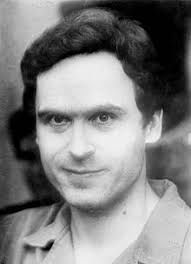Sex
Ted Bundy's Necrophilia
Can we learn anything from his first relationship?
Posted February 2, 2019 Reviewed by Kaja Perina

I have written a couple of posts fairly recently about necrophilia (The building blocks of necrophilia: The importance of olfaction and loving the living & The Appeal of Necrophilia) as I try to figure out why somebody would engage in this behavior. One of the best scholarly break downs of necrophilia, is the classification attempt by Aggrawal in his seminal paper 'A new classification of necrophilia'. Here are ten different types of necrophilia that cover a range of necrophiliac activities.
I explore what I think are the limitations of Aggrawal’s classification in ‘The building blocks of necrophilia’, but I also think sex with dead bodies can share the same two dimensions as consensual copulation with (alive) people, and sex with animals. Those two dimensions are:
- Opportunistic sex with the primary purpose of orgasm.
- A desire for both sexual and emotional intimacy.
I believe Bundy was a necrophiliac in the second category.
I am led to this conclusion after listening to some of his dialogue in the brilliant Netflix series, Conversations with a Killer: The Ted Bundy Tapes.
Bundy reflects on what is likely his first relationship with a woman, with Diane Edwards in 1973. Ted appears to have idolized this relationship, and portrays it in a way that is so perfect that he cannot seem to handle when it falls apart.
Her appearance is important to him:
"Beautiful dresses, beautiful girl. Very personable. Nice car, great parents."
The way in which he romanticizes their relationship is also important:
"We spent a lot of time driving around in her car, making out in the car, mumbling sweet nothings, and telling each other how we loved each other."
Later on, when Bundy is abducting, raping, and engaging in necrophilia, he has control over his victims' appearance and recognizes the potential of the dead body to be anyone he wants them to be. He also spent extended periods of time with the unconscious/semi conscious victim lying prostrate in his Volkswagen Beetle where the passenger seat would normally have been. It is not clear if he took the bodies straight to his grave site out in the Washington wilderness or if he chose to drive with his victim, but either way he spent a long time with his victims.
This seems to suggest that his relationship with Diane informed his preferences for interactions (relationships) with his victims.
Diane had such an impact on Ted that she inspired him to look at himself to become something more. We can all point to people in our lives who helped change us, and they can be used almost as milestones in our lives as we transitioned in a different direction. For Ted to care that much for what Diane was to him (hard to know if he cared for her, specifically), his time with her could have, too, been transitional.
This transition certainly seems evident when Bundy discusses his insecurities in the relationship:
"I experienced any number of insecurities with Diane. There were occasions when I felt that she expected a great deal more from me than I was really capable of giving. I was not in a position to take her out and squire her around, uh, in the manner in which she was accustomed. But, uh, or buy her clothes or, you know… I think I was coming apart at the seams."
As obvious as it seems, corpses do not have expectations, and, if one should be so inclined, is a solution to experiencing this extreme anguish in a relationship.
Was Ted thinking or asking himself, at this time, what he wanted out of a relationship?
Further motivation can perhaps be seen in his final views on his relationship with Diane:
"Throughout the summer, Diane and I corresponded less and less. And then Diane stopped writing, and I started to get fearful about what she was up to. I had the overwhelming feeling of rejection that stemmed not just from her, but everything. The tail end of that summer is really a blank. I mean it was a nightmare for me. In there somewhere was to have some sort of revenge on Diane."
Necrophilia gave Ted complete power over his victims, which could have been his answer to never wanting to feel fearful or feel rejected again.
I am not suggesting that this one piece of dialogue, or these few events in his life, caused his necrophilia. Brains don’t form overnight (or in a vacuum). But we can sometimes find motivations that produce patterns.
Ted knew how he wanted to achieve intimacy. And there was no conscience to stand in his way.
© Jack Pemment, 2019
References
Aggrawal, A. (2009). A new classification of necrophilia. Journal of forensic and legal medicine, 16(6), 316-320.




